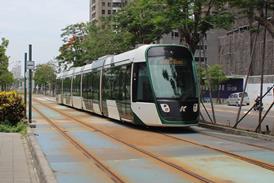Autonomous electric bus ready to be trialled in Singapore
By Metro Report International2019-03-07T06:00:00

SINGAPORE: Volvo has unveiled its first autonomous fully electric bus designed for passenger use, which is to undergo trials on the Nanyang Technological University campus.
Already have an account? LOG IN
To continue…
You’ve reached your limit of content for the month
Get enhanced access to Railway Gazette news and weekly newsletters.

For almost 200 years, the Railway Gazette Group has been the leading provider of news, analysis and intelligence for the international railway industry. Our independent and authoritative content is read by operators, regulators and the supply industry in over 140 countries using a variety of tailored subscription packages.
Site powered by Webvision Cloud



